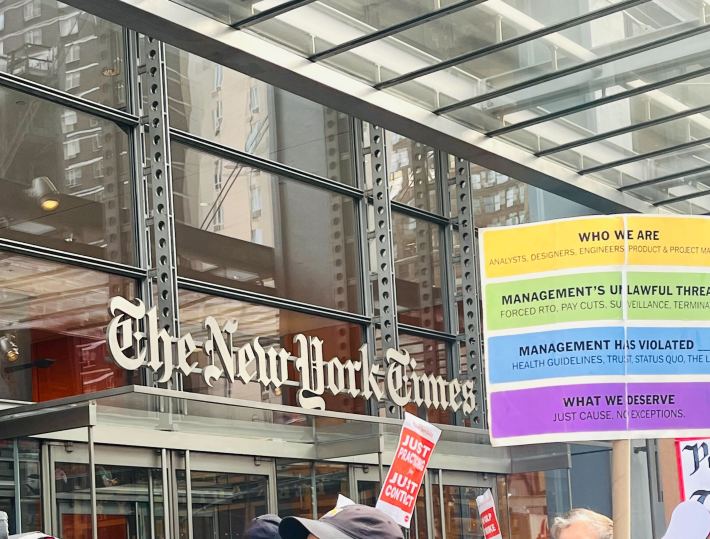The New York Times Tech Guild went on strike last night, after months of bargaining for a new contract and as election day in America looms. As part of that, the Guild has asked players of its games to respect the digital picket line and break their streaks.
“We ask that you not cross our digital picket line by playing any of the NYT Games (Wordle, Connections) as well as not using the Cooking App. You can continue to read New York Times news content,” the union wrote on Twitter this morning. The Times Guild, the union representing NYT writers, made a similar ask during a one-day walkout in 2022.
The Washington Post notes that the Tech Guild “comprises roughly 600 software engineers, product managers, data analysts and designers whose work on the company’s back-end systems undergirds much of the newspaper’s digital offerings, including live-blogs, mobile push alerts and the Times’ famous election needle.”
Given how critical its members are to the Times’ election day coverage, going on strike now is a brave move, and it’s unfortunate that the Guild felt pushed to this decision. The Guild has been negotiating this contract, its first, since 2022, and has staged several pickets and awareness campaigns during that time. The union and the company have yet to reach agreement on issues of pay equity, remote work, and just cause.
The Guild will be picketing outside the Times’ New York headquarters during the strike. We’ll update this blog with more information from the picket line.
Update, 3:30pm- Times Tech Guild members picketed and rallied outside the entrances to the Times building today. Several protest signs referenced the Times' popular games offerings, including Wordle, Connections, and the crossword.

A rally at 1pm featured speakers from the Tech Guild's parent union, the Communications Workers of America; the NewsGuild; members of the Times' editorial union and NPR's Digital Media United; and local politicians. NewsGuild president Jon Schleuss claimed the strike was the largest tech strike in history; of the Tech Guild's roughly 600 members, about half are remote. On Twitter, Schleuss further clarified that it is the "largest tech worker strike in U.S. history, largest tech worker union in the U.S, largest strike in [the NewsGuild] since at least 2001."
NewsGuild of New York president Susan DeCarava noted that the Times' stock had dropped more than 7% today. DeCarava said to striking workers, "You build, that's what you do. You build community, you build wealth, and you're building power... Let's see how much building happens when you're out here."
New York State Senator Julia Salazar said, "The strike is the most powerful tool the worker has" and that "New York Times management has the power to end this strike, they have the power to prevent any disruption in election day coverage." This language echoed an email to the newsroom from publisher AG Sulzberger today, who wrote "It is likely [the strike] will continue through the election... it is troubling the Tech Guild would try to block this public service at such a consequential moment for our country."
Sulzberger wrote that "we have robust plans in place to ensure that our essential journalism still reaches our readers." The Tech Guild previously claimed that management attempted to subvert the strike through contractors. Times media reporter Katie Robertson wrote on Twitter today that "The New York Times newsroom union reminded its members today that there’s a no-strike clause in its contract — but members can support the striking tech workers by refusing to do their work if asked by management." According to the NewsGuild, "Members of the newsroom union, Times Guild, have pledged not to do struck work, a right that’s protected under their contract."
Staff engineer and Tech Guild member Sarah Duncan reiterated to Aftermath the Guild's focus on pay equity, remote work, and just cause, noting that tech workers are not paid to be on call. Duncan pointed to the Guild's report on pay disparity, which found among the unit that women earn 12% less than men; Black, Hispanic, and Latina women earn 33% less than white women; and that Black workers earn 26% less than white workers. In regards to just cause, Duncan noted that the newsroom has had this protection in its contract for decades.


